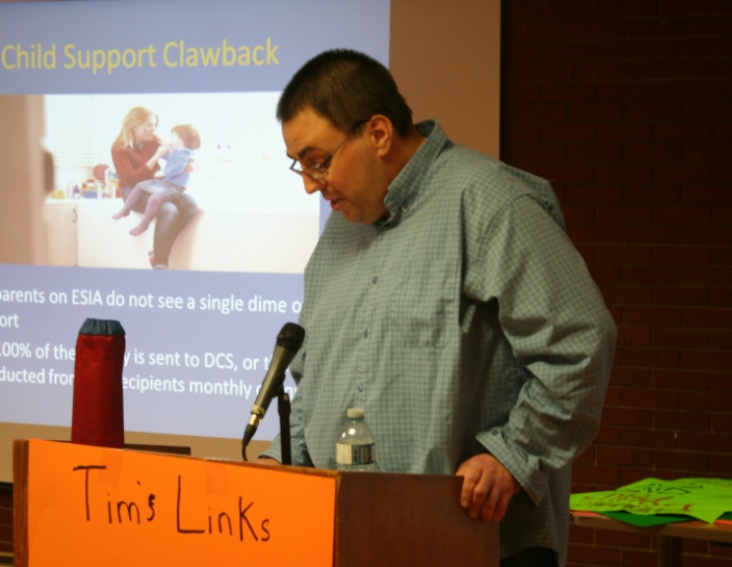KJIPUKTUK (Halifax) – In 1989, the House of Commons voted unanimously to end child poverty by the year 2000. I’ve heard this fact several times in the last few weeks.
This fact was referred to during the Shift for Brains podcast. Jackie Torrens (“My Week on Welfare”) and I were Bill Carr’s guests for that episode. The topic was food insecurity in Nova Scotia. You can listen to that here.

Recently, a coalition of anti-poverty groups gathered for a press conference and a call to action. The Benefits Reform Action Group (I am a member of BRAG) was one of those groups. A BRAG colleague mentioned the 1989 House of Commons proclamation. (You can watch the press conference by clicking here.)
This fact has been mentioned several times while I was in conversation with colleagues and friends.
It is now 2018.
BRAG has had the privilege of hosting the community for two free public screenings of the 2015 documentary “My Week on Welfare”. These screenings featured time for the audience to share their stories, and featured speeches from BRAG members and other first voices and advocates. I spoke at both screenings.
My second speech was very personal. In it, I spoke about my childhood. Here is an excerpt from my speech:
“I now realize that I am a First Voice when it comes to this issue. I was a child on the system. I was a child with poor quality clothing, I was a child who struggled with food insecurity. I was a child who was made fun of because the teacher gave me something to eat. I was a child who at 10, 11, 12 years old would often think about and talk about suicide. “If you can’t eat, why bother living?” I would say at that time….Thankfully, I did not attempt to take my life, but I still struggle with depression to this day. I also had stomach ulcers as a child. The connection between poverty and physical/mental health is undeniable, even in children. I know this, because I was a child living in poverty.”
In My Week on Welfare, Jackie Torrens discusses her life as a single mom on welfare. Both of our lives were impacted by the 100% child support clawback. If you receive Income Assistance (aka welfare) you do not get to keep a single dime of child support. My father wasn’t in my life. Even if he was, and he wanted to pay child support, it wouldn’t have made one ounce of financial difference in my life. Think about that. I was a child struggling with poverty, food insecurity, depression, physical health issues, and the physical and financial presence of my father wouldn’t have made a difference in my life, due to the child support clawback. In fact, the presence of my father could actually have made my situation worse, much like it did Jackie’s, thanks largely due to the child support clawback. My struggles as a child and Jackie’s struggles as a young mother were largely in the late 80s and early 90s.
The child support clawback still exists.
It’s 2018.
The myth is that welfare recipients receive allowances for telephones, transportation, and that all their basic needs are taken care of. The reality is that telephone and transportation allowances (in addition to special diet allowances) are based on a medical need. Please keep in mind that the basic income assistance rates are $575 ($300 shelter allowance for an able-bodied person; $275 personal allowance) and $810 ($535 shelter allowance for a disabled person; $275 personal allowance).
The shelter rates haven’t risen since 1995.
It’s 2018.
Even if someone were “fortunate” enough to get a special diet, telephone, or special diet allowance, that money is often spent on a power bill, or rent, or an emergency. People are going hungry because a combination of expenses and woefully inadequate welfare rates force them to go hungry. The minimum wage is not a livable wage as it is. If you are on welfare in NS, and you are working (even part-time), you can earn up to $150 a month and keep it; any earnings above $150 are clawed back 70%. And let’s not forget the rising cost of food.
Fifty percent of all food bank clients in Nova Scotia are welfare recipients. Yet Nova Scotia funded Feed Nova Scotia to the tune of $12,000 last year, less than one percent of Feed Nova Scotia’s annual operating budget.
Right now, you might be wondering “What can I do?” I would suggest one thing: Speak up. Write your MLA, the Premier, write any politician you can think of. Write to your local newspaper. If you have a personal story, share it. Share your story publicly online, on social media.
I am a co-chair of a group looking to end the child support claw back in Nova Scotia. You can join us. E-mail us at cscactiongroup@gmail.com. I am also a member of BRAG, Benefits Reform action group, which is a group of first voices and professionals who advocate for changes to the welfare system. You can find us on Facebook. This is an action that we are working on right now. It’s made national headlines. Please consider signing our petition.
If you are not able to share your story publicly or you don’t feel comfortable joining in any action, that is ok, too. NSadvocate.org has a wonderful, anonymous series called LivesOnWelfare. (#LivesOnWelfare). Contact the Nova Scotia Advocate to tell your story anonymously.
Above all else, talk. Speak up. Share your story. I speak from experience that when you speak up, you can open eyes to what is going on and embolden others to speak up as well. To have such poverty in Nova Scotia is unconscionable. It’s time for a change. It’s 2018.
Originally posted on the Feed Nova Scotia blog. Please consider making a donation. You can even sign up for a $25 Loblaw’s (Superstore, No Frills) card and donate that card. Feed Nova Scotia would love to receive those cards as a donation.




I’m not sure where you get those figures for Entitlement? I get $810 which includes my phone $28.00- Special Diet $27.00 and Over payment $35.00 – so $845 as a Disabled Person. I even had to Appeal a Decision to keep my $150.00 working allowance – which they don’t deduct anything for Transportation Costs.
I do understand how difficult it can be trying to live on Assistance, and the Mental Health Issues associated with Living on Poverty and Dealing with Social Assistance.
It’s Particularly SAD Social Services will wait till people become so Mentally Ill, they pay for Drugs and Transportation to Medical Appointments…. even Pay $100’s / per day/ per person -in Residential Care Facilities, once they’ve Destroyed someone’s life.